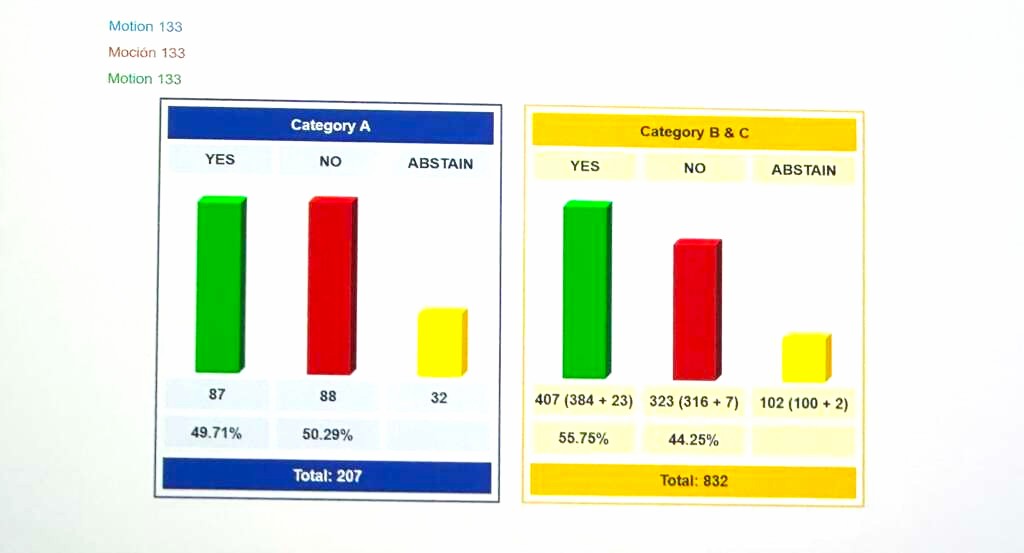Close vote reveals divisions in IUCN membership over genetic engineering
Abu Dhabi, 15 October 2025 — In a widely anticipated but deeply concerning decision, IUCN members have implicitly endorsed the use of genetic engineering in nature conservation — despite insufficient scientific evidence and the absence of effective regulations to manage its risks.
By rejecting a proposed moratorium on high-risk applications such as gene drives, IUCN has decided to ignore the need for adequate safeguards against irreversible harm to nature. These technologies could permanently alter or eradicate species, triggering cascading effects across entire ecosystems.
To pass, the motion needed more than 50% support in both categories — governments and non-governmental organisations — and it came down to a very close call. Among governments, the result was 87 in favour and 88 against. Among non-governmental organisations, the result was 407 in favour and 323 against.
Franziska Achterberg, Head of Policy at Save Our Seeds, a supporter of the moratorium motion:
Today’s decision suggests IUCN members are placing their hopes in high-risk technologies with uncertain outcomes. Nature cannot afford experiments with potentially severe, irreversible outcomes — proven conservation measures must take priority over speculative genetic engineering.
Over 120 scientists — including contributors to the Intergovernmental Science-Policy Platform on Biodiversity and Ecosystem Services (IPBES) — have also urged caution. In an open letter released ahead of the vote, they warned that releasing genetically engineered organisms into ecosystems could cause irreversible ecological disruptions.
Dr Joann Sy, Scientific Advisor, Pollinis, the main sponsor of the moratorium motion:
The question remains whether the genetic engineering of wild species truly aligns with IUCN’s mission to protect nature’s integrity and diversity. Evaluating each application separately does not address the deeper ethical and ecological issues at stake.
Malick Shahbaz Ahmed, Executive Director of the Sungi Development Foundation, a co-sponsor of the moratorium motion:
It is alarming to see how a few well-resourced technology developers have managed to shape IUCN’s agenda. Most members are unlikely to embrace genetic engineering in nature conservation, yet the organisation as a whole has failed to distance itself from high-risk technologies driven by commercial interests. Decisions on new technologies that could endanger nature must be guided by precaution, integrity, and the voices of the most vulnerable.
ENDS
About Save Our Seeds
Save Our Seeds is a campaign run by the German Foundation on Future Farming. Since 2002, it has successfully spearheaded efforts to avoid GMO contamination of seeds and maintain precautionary GMO legislation at national and EU levels. The Foundation on Future Farming is a member of Deutscher Naturschutzring (DNR), a co-sponsor of the moratorium motion.
About POLLINIS
POLLINIS is an independent NGO working to protect domestic and wild bees and promote agriculture that respects all pollinators. Founded in 2012, the non-profit organisation now has more than 1.3 million supporters across Europe and over 20,000 donors. POLLINIS is funded exclusively by donations from individuals, which guarantees its absolute independence. Co-sponsor and support Motion 133 on a moratorium on genetically engineering wild species in natural ecosystems.
About Sungi Development Foundation
Sungi Development Foundation, Pakistan, is a rights-based community-driven organisation advancing climate action. We empower vulnerable communities by strengthening their capacity in nature-based solutions, biodiversity conservation, indigenous farming and social forestry to mitigate climate change.
Notes to editors:
- More and more proposals are being made to genetically engineer nature – not only domesticated crops and livestock, but wild species within complex ecosystems. Proposals range from eradicating mosquito populations and invasive species (such as mice, rabbits or snails), to making endangered animals disease-resistant or even ‘reviving’ extinct species (such as the mammoth or the dire wolf).
- Motion 133, rejected by the IUCN Congress, calls on IUCN members not to consider the release of genetically engineered wild organisms or gene silencing technologies until the IUCN World Conservation Congress formally votes to decide otherwise.
- Motion 087, adopted by the IUCN Congress, promotes a case-by-case approach for any application of synthetic biology, disregarding differences in risk profiles.
- Over 120 scientists signed an open letter supporting the call for a precautionary pause. The letter is available here.
More background:
- Background & case studies: https://engineeringnature.org/examples/
- Q&A on Motion 133 and its scope: https://engineeringnature.org/faq/
Media contacts:
Franziska Achterberg, Head of Policy, Save Our Seeds, , +32 498 362403
Maria Elena De Matteo, Communications Strategist, +82 10 68 35 59 66,
Helene Angot, Communications Officer, +33 6 12 84 06 97,
Malick Shahbaz Ahmed, Executive Director of the Sungi Development Foundation, , +92 300 5556324
Pour lire ce communiqué de presse en français, cliquez ici.

